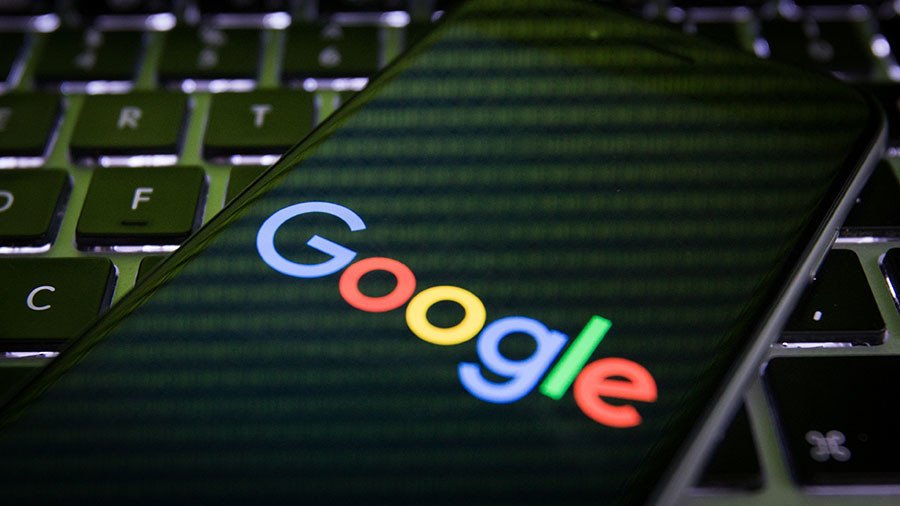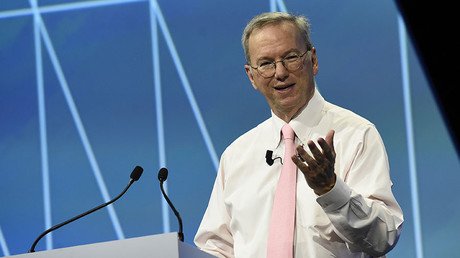Google’s de-ranking of RT in search results is a form of censorship and blatant propaganda

Who is the true propagandist? The man who offers you information which you can freely choose to believe or disregard — or the man who tries to control what you see, for fear you might start using your own brain to distinguish truth from lies?
That is essentially what Eric Schmidt, the Executive Chairman of Google’s parent company Alphabet, is doing when it comes to news articles from this website, RT. Schmidt was closely involved in Hillary Clinton’s campaign for president, and in a recent interview he admitted that Google is creating special algorithms to filter RT’s news and make it appear less prominently in Google’s search results. In his own words, Google is trying to “engineer the systems” to make RT’s content less visible.
The ostensible goal of this search-engine-doctoring is to combat “propaganda” and “misinformation” from Russia. Its true purpose is to control the political narrative, in order to keep people from reading different perspectives and asking inconvenient questions.
The truth is, if RT was spewing out nothing but falsehoods and lies every day Google wouldn’t need to “de-rank” it, because it would be totally irrelevant as a very limited number of people would choose to read it. This brings us to the paradox inherent in the hysteria over RT: Its critics can’t seem to decide what they want you to believe. Is RT an all-powerful entity with the ability to take over and fry your brain, or is its impact on our feeble minds totally insignificant?
Propaganda is not just about what you say, it’s also about what you don’t say. In Google’s case, it’s about what you choose to promote and what you choose to hide or obscure. The justification given for de-ranking RT is that it spreads lies – but Schmidt gave no examples.
In the same interview, Schmidt says he is “very strongly not in favor of censorship” and that Google would never outright “ban” RT. What Schmidt seems to miss is that banning something is not the only form of censorship. Google is using its immense power to control what people are seeing and – no surprises here – Google would prefer it if you saw more flattering coverage of itself and the US government institutions to which it is intimately linked. That is censorship, whether Schmidt wants to admit it or not.
It is not just Russian sites that Google is de-ranking either. The corporation which enjoys almost complete monopoly over the internet has already been criticized for censoring left-wing, anti-war websites like Alternet, Democracy Now, Truth-out.org, Counterpunch and Truthdig. Some of those websites have reported huge drops in traffic since changes were made to Google’s search algorithms to combat “fake news”. Nothing could demonstrate more clearly that Google is a cheerleader for American militarism and a loyal partner to war profiteers both in the arms industry and in Congress. Yet the corporation still enjoys a widespread reputation as a benign arbiter of truth.
‘Modern censorship: Google decides RT is propaganda, yet millions disagree’ https://t.co/qDbaHV5Xtzpic.twitter.com/hOv4q9z7WG
— RT (@RT_com) November 21, 2017
Ultimately, Google wants to babysit you on the internet. Schmidt thinks he needs to hold your hand and tell you what to read and who to believe. De-ranking sites like RT is a slippery slope into an ever more Orwellian future, but journalists at mainstream publications don’t seem to care. In fact, their coverage of it seems more supportive than anything. After all, they’re the ones getting the bump from this kind of censorship.
A journalist with integrity who truly cared about internet freedom would admit that, as much as he or she may dislike RT or other “de-ranked” websites, there is a bigger issue. That issue is preventing government-linked corporations like Google from wielding unlimited power and acting as the ultimate referee on truth. By staying silent on this, journalists are essentially telling us that they are perfectly comfortable with state-authorized entities like Google telling us all how the world works.
If Google de-ranked every news website that occasionally got things wrong or delivered misinformation to its audience, there would be nothing left to read. Moreover, if Google’s real concern was the spread of misinformation then it would already have de-ranked sites like CNN, MSNBC, Fox and a whole host of other mainstream American news outlets for cheerleading wars based on lies and giving disproportionate airtime to pro-military-intervention pundits and analysts.
There are no lies in this very RT article you are reading. There is some factual information which is followed up with informed opinion. But Schmidt would still prefer if you weren’t reading it. He’d probably rather you read this piece from Vice’s Motherboard or this piece from the Guardian, which both paint his de-ranking initiative as some kind of heroic stand against the evils of differing perspectives.
But there is one good bit of news in all this.
De-ranking RT sends a strong message that Google is afraid. Not just of RT, but of any information – from anywhere – which contradicts its narrative and questions its credibility and motives. De-ranking RT is an admission that they are worried their own ideas can’t win in a fair fight; that they are so insecure in their narrative of ‘freedom’ that they are resorting to ever more authoritarian methods to make you believe it all stands up to scrutiny. It is incredibly ironic, when you really think about it.
Google makes millions of pounds “in advertising revenue from videos that exploit young children and appeal to pedophiles,” according to a recent report in the Times of London. So, let’s not be fooled into believing that Google has all of our best interests at heart.
There is nothing good or noble about de-ranking RT. It’s not a war against Russian propaganda that Google has engaged in. It’s not a war against “fake news” or misinformation. It’s a war of ideas on a much, much wider scale.
It’s a war against anything that Google executives in Silicon Valley and their collaborators in government deem to be the wrong kind of news, the wrong kind of ideas, the wrong way of thinking.
That’s censorship and propaganda any way you slice it.
The statements, views and opinions expressed in this column are solely those of the author and do not necessarily represent those of RT.















